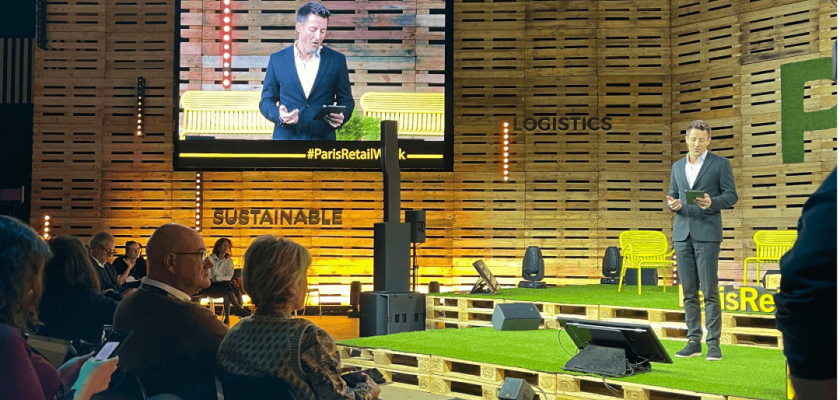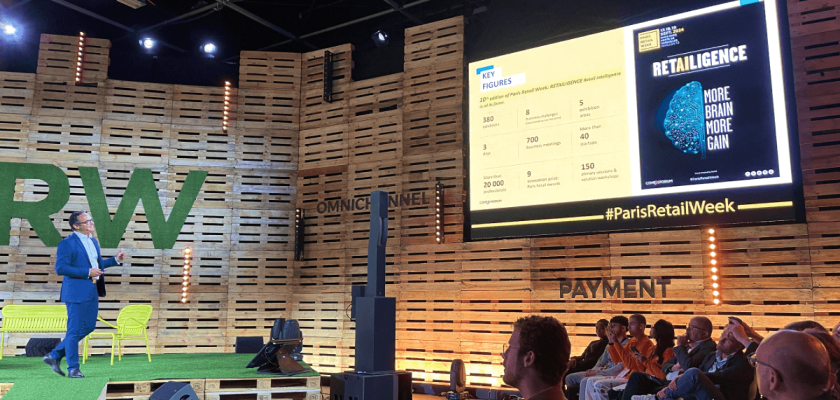
The AI Revolution in Retail: Challenges, Opportunities, and Future Trends
During the 2024 Paris Retail Week, Europe’s premier event for the retail and commerce industry, Havas Commerce published a global report that revealed critical insights into AI’s growing influence on the retail landscape.
The report, based on a comprehensive survey of 500 industry professionals across 21 countries and various business models, analyzed key trends and challenges in AI adoption. It explored the opportunities AI brings to retail while also highlighting technological and business trends. This article dives into these findings and explores the future direction of AI in retail, based on the field report from our guest author, Zsolt Farkas.
The survey targeted a variety of business models, including eCommerce, Click & Mortar, Brick & Mortar, and DTC companies. Participants held positions ranging from Owners and Senior Management to Middle and Frontline Management, ensuring a broad perspective on AI integration.
Declining Purchasing Power
The survey data clearly shows a significant decline in purchasing power, with 79% of respondents in 2024 acknowledging this decrease, up from 72% in 2023. This trend suggests growing economic pressure on consumers, which has important implications for the retail sector. As purchasing power weakens, businesses will likely see shifts in consumer behavior, such as prioritizing essential goods, reducing discretionary spending, and seeking greater value through discounts and promotions.
- Emphasis on Value: In the coming years, consumers will likely continue seeking out brands that offer not only competitive pricing but also value-added services, such as faster delivery, seamless omnichannel experiences, and enhanced customer support.
- AI and Automation: As purchasing power declines, retailers will be under increasing pressure to optimize operations. The integration of AI and automation will be crucial for businesses to remain competitive by reducing costs and improving customer experiences.

Fundamental Transformations
The survey asked about the essential transformations companies need to implement in order to survive and decrease the effects of the recession. 37% of respondents said that expanding their product and service range is a priority. Additionally, a discount strategy and online customer experience transformation were also ranked among the top five priorities.
The data reveals a clear shift in business goals towards digital transformation and innovation. The highest allocation of future budgets is set to go towards digital investments (38%), reflecting a continued emphasis on enhancing online presence, e-commerce capabilities, and digital infrastructure. Additionally, the focus on developing new innovative products (30%) and artificial intelligence (28%) highlights the growing importance of tech-driven solutions that can streamline operations and offer personalized customer experiences.
While environmental approaches (9%) and corporate social responsibility (CSR) products (6%) are lower on the priority list, their involvement signals that sustainability is still a consideration, even though secondary to immediate operational and technological needs.
Trends Redefining the Future
According to the respondents, three major trends are set to shape the future of retail: delivery optimization (38%), social media content creation (34%), and the rise of premium services (29%). The increasing emphasis on delivery options – such as click and collect, drive-thru, and faster logistics – reflects the growing consumer demand for speed and convenience in shopping experiences. Premiumization is becoming more important as consumers increasingly seek personalized, high-quality services and products that offer enhanced value.
Meanwhile, social content, especially user generated videos (UGC) on platforms like Instagram and TikTok, continues to play a critical role to engage customers and drive sales through creative, interactive content.
Amazon and TikTok recently signed a significant partnership allowing TikTok users to shop for Amazon products directly within the TikTok app. This integration makes it possible for users to view Amazon product recommendations in their TikTok feed and complete purchases without leaving the platform. By linking TikTok and Amazon accounts, users can access real-time pricing, Prime eligibility, and delivery details within the app. This deal is expected to boost “social shopping” and contribute to TikTok’s goal of increasing U.S. e-commerce volume.
Additionally, premium services are becoming more prominent as retailers aim to provide personalized and better experiences to attract and retain customers. Together, these trends indicate that the future of retail will be highly influenced by seamless customer experiences, digital engagement, and enhanced service offerings.
Technical Innovations
According to respondents, faster delivery emerged as the most promising technical innovation, with 93% considering it crucial for their businesses. This highlights the increasing importance of speed and efficiency in meeting customer expectations. Beyond traditional methods like click-and-collect and same-day delivery, the potential for automated delivery via drones is becoming a reality. Recent advancements in drone regulations, particularly in the U.S. and Europe, are paving the way for commercial drone deliveries. For instance, the FAA Reauthorization Act of 2024 and other regulatory updates now allow drones to operate beyond the visual line of sight and in more complex scenarios, including urban environments.
In addition to delivery, artificial intelligence (AI) is seen as a game-changer, with 74% of respondents considering it promising and 39% labeling it “very promising.” AI’s potential to streamline operations, improve personalization, and analyze big amounts of data makes it a vital tool for the future of retail. In the changing retail landscape, one of AI’s promising areas is transforming customer service capabilities. As companies explore future strategies, employing generative AI for enterprise can bring breakthroughs in enhancing customer support mechanisms. This approach not only streamlines responses and personalizes interactions but also drives operational efficiency. In retail, where customer experience holds immense significance, integrating such AI solutions could redefine traditional service models and establish lasting relationships with consumers. Other innovations such as cashless stores (73%) like Amazon Fresh, biometric payment (66%), and augmented reality (60%) also show how technology is reshaping the shopping experience. These improvements, including voice technology and virtual fitting rooms like Glamlabs, reflect the growing trend of integrating cutting-edge digital solutions to enhance both operational efficiency and customer interaction in retail.

The Role of AI in Retail
While AI is increasingly recognized as an important tool for businesses, only 14% of companies currently consider it a central part of their overall digital transformation strategy. The majority, 28%, are in the exploratory phase, using AI on a trial basis to evaluate its potential, while 23% see it as a secondary but significant component of their operations. Meanwhile, 20% have not yet integrated AI into their strategies, and 15% find it not applicable to their current business needs.
The report shows that AI is becoming an integral part of many businesses, with 46% of companies currently using AI technologies in their operations. However, this also indicates that more than half (54%) have yet to integrate AI, showing there is still significant room for adoption.
Among those using AI, the most common applications include chatbots and personal assistants (58%), which streamline customer service and communication processes. Additionally, predictive analytics is a key application, with 34% using it for marketing and sales, and 22% employing it for supply chain and operational forecasting. This is followed by recommendation engines (23%), which are pivotal for personalizing customer experiences, and operations and supply chain automation (17%), which help streamline logistics and reduce costs.
As businesses continue to adopt AI, its uses will likely expand into more innovative areas like AR/VR projections (8%) and frictionless shopping (4%), pushing the boundaries of what AI can achieve in retail and e-commerce.
The survey highlights that AI’s biggest advantage is in improving operational efficiency, with 45% of businesses reporting this benefit. AI helps streamline processes, reduce manual tasks, and enhance productivity. Additionally, 38% of respondents observed cost reductions, as AI optimizes resources and cuts unnecessary expenses. Other great benefits include improved product information management (31%), increased sales and conversions (29%), and enhanced customer satisfaction (28%), all of which reflect AI’s role in both operational and customer-facing improvements.
Summary
Data shows that companies learned quickly, and the tough times pushed them to adopt technologies that help them become more efficient. Typically, new technologies have a slower adoption curve, but economic challenges and uncertainty have motivated companies around the world to adapt faster.
Looking ahead, this rapid adoption of technology may become the norm rather than the exception. As companies experience the benefits of AI-driven efficiencies, such as predictive analytics and automated customer service, we can expect further investments in advanced tools. Future implications include a greater reliance on AI for strategic decision-making, the automation of routine tasks, and enhanced customer experiences.



















